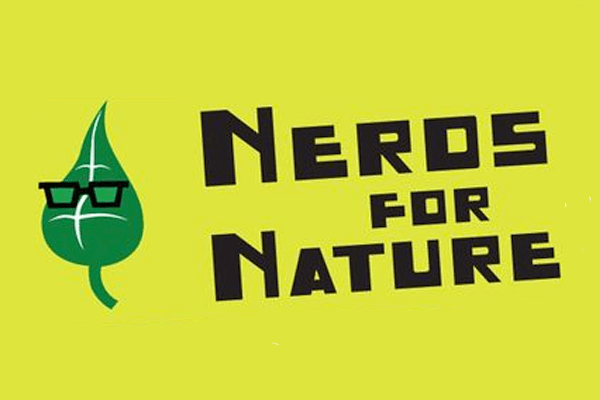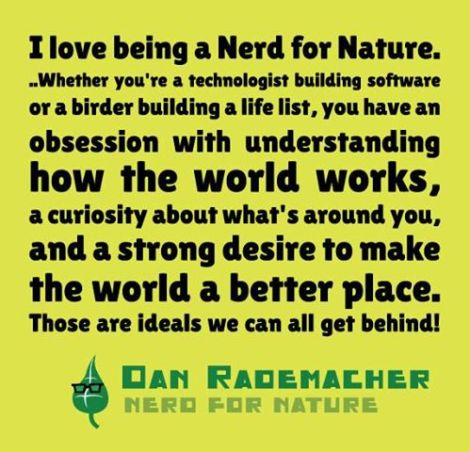Victoria Bogdan doesn’t have the nicest things to say about environmental nonprofits. As a freelance grant writer, she works hard to raise money to support important eco causes, but she was a little disappointed by the big organizing ideas that money helped bankroll.
“They seemed woefully behind in their use of technologies and even in their imagination, just thinking about what is possible,” she says.
“I started asking at conferences I went to, ‘If you had access to designers and developers and young people thinking about things in interesting ways, what would you do? What would you dream up that would be possible for your organization?’ And more often than not the response was something like, ‘Oh, you mean using Facebook for, like, fundraising?'” Bogdan cringes a bit and laughs. “I would shake my head and say, no, no, no …”
Bogdan is one of the Nerds for Nature, a motley group of programmers, designers, and storytellers that aim for a little more yes, yes, yes when it comes to environmental technologies.
Born at last summer’s Code for Oakland civic hackathon, the Nerds are just one of a host of efforts aimed at bringing basic technological tools and cultural awareness to stodgy institutions that are traditionally a little afraid of change.
“I have an interest in seeing these environmental nonprofits do well in the world, and I would like to see them not fall so incredibly far behind that they think fundraising on Facebook is the cutting edge,” says Bogdan. “We thought, if we could even just bring together in one room the tech-capable with the environmental professionals, and just facilitate an exchange of ideas — just begin that dialogue — that would be something new.”
So far, the Nerds for Nature are building cheap air quality sensors, BioBlitzing urban parks — identifying dozens of local plants and animals, some of which scientists didn’t even know were there — and organizing much-needed networking events to promote collaborative work.
One of the most popular ways to get these kinds of projects off the ground is with those hackathons — a popular EcoHack hit San Francisco and New York just this past February. But the Nerds are already kind of over it.
“At first we were like, we should have a hackathon! And then we realized that none of us wanted to do a hackathon — we actually wanted to meet each other, go on field trips, and work on projects that are really community focused,” says Chacha Sikes, a former Code for America fellow.
The Nerds are neither tech mercenaries nor wide-eyed flower children: Sikes, along with Laci Videmsky, works on the New California Water Atlas; Dan Rademacher is the former editor of Bay Nature magazine and worked on the Transit to Trails project; Martha Pettit is a designer and nonprofit consultant who organized with Occupy.
And yes, they are all decidedly and unapologetically nerdy.
Still “just a baby organization,” the Nerds are not a company, a nonprofit, an activist network — they’re not even really a united front. “We’re a pretty diverse group in terms of opinions, and I think that’s what makes Nerds for Nature really strong,” says Pettit. “We’re comfortable arguing.”
Some of the Nerds want to work primarily to create a networking group that could influence both environmental groups and technology; others would rather focus on solving community problems; some want to engage in citizen science discovery projects; others want to interface directly with government.
“Groups like Code for America send coders and geeks to city halls — why don’t we also send those people to bureaus of land, energy, and water? They could benefit from the ethos of open government, open data, and civic hacking too,” says Videmsky. “That’s where I’d like to see this project go.”
The group’s success will stem from its ability to be a cool touchstone for organization and inspiration in a region full of technologists and environmentalists who don’t overlap much. Events like BioBlitzes draw in technologists who are nature-curious, and environmentalists who know how to work iPhones — and then serve as a meeting point for larger collaborations at the institutional and community level. Instead of working backward, making cool stuff that maybe no one has any use for, the Nerds are first trying to pair the people who make the tools with the people who need them.
“We want to be a dating service for techies and environmentalists,” Pettit tells me. “I feel very stuck in the middle, and at Nerds for Nature, we all have that sense — we see both sides of the coin.”
That’s where the Nerds seem poised to have some influence in both communities, at an important historical moment. “There’s a sort of urgency around the realities of climate change and resilience planning,” says Sikes. “Over the last few years, I’ve started to find more people who are doers — it’s a common thread in maker culture and civic hackers. Maybe that sort of infectious optimism could spread to environmental groups.”
Technology companies sometimes make cool tools that environmentalists can use, but they don’t do much if anything to maintain a community around those projects, which is where the Nerds hope to step in.
“Technologists are very powerful right now,” says Pettit. “They have a lot of ability and skills that could be used for good or evil.” In the Bay Area, with great tech power comes great hordes of money — or great civic responsibility. Facebook’s motto, “Move fast and break things,” might as well sum up the whole industry — and that’s kind of a terrifying prospect when it comes to our ailing planet.
On the other hand, in the environmental nonprofit world, “the resources are so scarce, it’s very hard to contemplate failure — and because it’s very hard to contemplate failure, it’s very hard to shoot for big success,” says Rademacher.
The Nerds are under no illusions about the limits of their own power: It would be nice to solve problems in the future, it would be cool to work with government, it would be great to have Nerds for Nature groups pop up in cities across the country. Each of the Nerds excitedly gives me his or her wish list of projects and events — but these are all plans for further down the road. Ultimately the group could facilitate directors of innovation at nonprofits like the Sierra Club, come up with air quality educational projects in particularly polluted communities, or start a Code for the Environment program to work with natural resource agencies.
Right now, though, they’re sticking to their roots: The first Nerds for Nature speed-dating event is set for August 16. Tickets are $5. Keep it clean — and nerdy.




